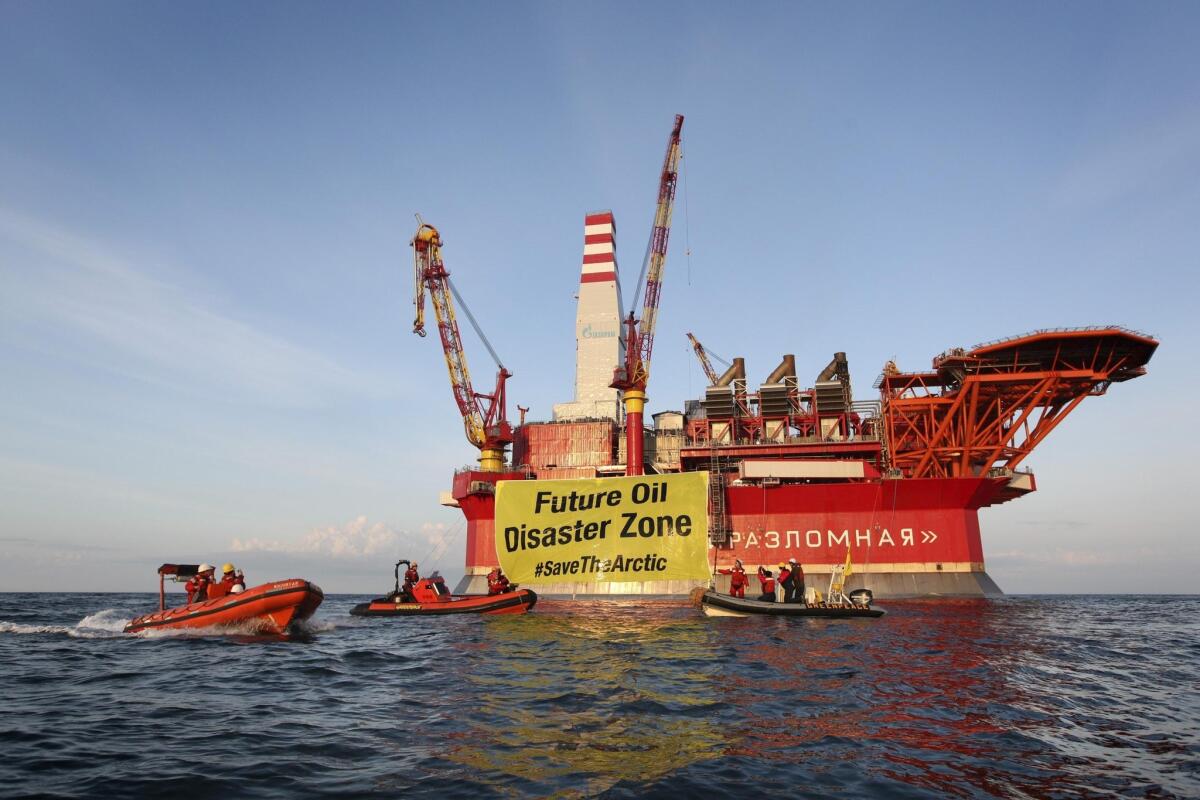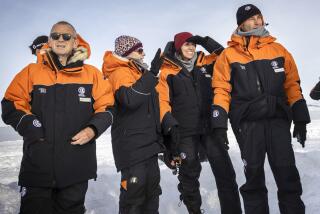Russia claims vast Arctic territory, seeks U.N. recognition

In this Aug. 25, 2012, file photo provided by Greenpeace, a banner unfurled by activists who scaled the Gazprom Prirazlomnaya oil-drilling platform in the Barents Sea warns of environmental disaster from exploitation of Arctic resources.
The Russian government on Tuesday announced that it had delivered “ample scientific data” to the United Nations to back its claim to more than 460,000 square miles of Arctic territory and the wealth of energy, gems and precious metals believed to lie within.
Moscow also is asserting ownership of the emerging Northern Sea Route, the potentially lucrative seasonal shipping route opening above its northern coastline as Arctic ice melts.
Russia was the first to claim the Arctic sea shelf as sovereign territory in a thwarted bid in 2002, but the United States, Canada, Denmark and Norway also are pursuing jurisdiction over seabed in the Arctic, where a quarter of the world’s remaining oil and gas reserves may be embedded.
The 1982 U.N. Convention on the Law of the Sea establishes the right of countries to exercise sovereignty over an exclusive economic zone extending 200 nautical miles from their recognized shoreline borders. In cases where the continental shelf extends beyond that limit, the law of the sea allows a country to claim dominion up to 350 nautical miles from its shores.
In the documents submitted to the U.N. on Monday, Russia argues that the undersea territory it seeks to add to its recognized borders doesn’t fall under the 350-mile limit because the seabed and its resources are “natural components of the continent,” the Russian Foreign Ministry said in a statement.
The statement said Russia expects the U.N. to begin considering its claim at a fall meeting of the U.N. Commission on the Limits of the Continental Shelf. But a U.N. spokesman, Farhan Haq, said that the commission isn’t expected to gather in full until early next year and that in the meantime, Russia’s submitted charts, maps and research data were being circulated among the 193 member nations of the world body for review.
Russia first laid claim to the Arctic sea shelf in 2002, but its application for U.N. recognition was rejected on the grounds that Moscow hadn’t provided sufficient evidence of the country’s right to the territory.
“To justify Russia’s rights in this area, ample scientific data collected during many years of Arctic research has been used,” the Foreign Ministry statement said, alluding to exploratory missions and development of Arctic research facilities and floating ice stations going back to the 1930s.
Russia’s Ministry of Natural Resources estimates the Arctic sea shelf contains up to 5 billion tons of untapped oil and natural gas reserves worth as much as $30 trillion.
Russian polar explorers in 2007 made a symbolic claim to the vast territory and maritime rights when they dropped a titanium-encased Russian flag on the seabed under the North Pole from a submarine.
The Russian Defense Ministry has also flexed its muscle over the contested Arctic riches with a massive military exercise in March that deployed 40,000 troops, 50 warships and more than 100 combat aircraft into and over the Barents Sea. The Kremlin also announced last year in its revised strategic defense doctrine that a new Northern Fleet is being developed to protect its Arctic resources.
Retreating Arctic sea ice has opened up a summer shipping route across northern Russia that can cut a cargo vessel’s sailing time from Europe to Asia by nearly two weeks, raising the prospect of new income streams for Russia if its national claim to the Northern Sea Route is recognized by the United Nations. Russia boasts the world’s most powerful icebreaker fleet and has plans to expand its nuclear-powered vessels to assist foreign cargo ships through the passage that remains icebound for much of the year.
Environmental groups are warning against a rush to develop the Arctic shipping route and extract the energy resources under the sea bed.
“The melting of the Arctic ice is uncovering a new and vulnerable sea, but countries like Russia and Norway want to turn it into the next Saudi Arabia,” Greenpeace Russia Arctic campaigner Vladimir Chuprov said in a statement. “Unless we act together, this region could be dotted with oil wells and fishing fleets within our lifetimes.”
U.S. Secretary of State John F. Kerry issued similar warnings about the fragile Arctic when he took the helm of the eight-nation Arctic Council at a summit in Canada’s Far North in April.
“The Arctic is warming faster than any other region on Earth. Temperatures are increasing at more than twice the rate of the global average, which means the resilience of Arctic communities and ecosystems and the ability of future generations to adapt and live and prosper in the Arctic is tragically, but actually, in jeopardy,” Kerry said. He added that it is “imperative that the development we pursue is sensitive to the lifestyle and history that people want to hold on to, and also that it is sustainable.”
At a Russian government-sponsored Arctic development conference in Moscow in January, scientists and economists disclosed their projections that the sea shelf being pursued contains 90% of Russia’s remaining nickel, cobalt and platinum, 60% of copper, and practically all of the country’s explored reserves of titanium, tin and barite. The Arctic subsoil may also hold 70% to 90% of Russian reserves of gold, diamonds, lead, bauxites and other minerals, the Tass news agency reported from the conference.
The 463,000-square-mile sea shelf claimed by Russia includes the Lomonosov Ridge, the Mendeleyev-Alpha Rise and the Chukchi Plateau, as well as the Podvodnikov and Chukchi basins that separate the three areas, according to the Russian documents submitted to the U.N. commission.
Follow @cjwilliamslat for the latest international news 24/7
ALSO:
Russia expels Swedish diplomat in latest sign of tension in Baltics
Russia says U.S. support for Syrian rebels portends wider Mideast chaos
Russia uses U.N. veto power to scuttle tribunal for MH-17 downing
More to Read
Sign up for Essential California
The most important California stories and recommendations in your inbox every morning.
You may occasionally receive promotional content from the Los Angeles Times.











